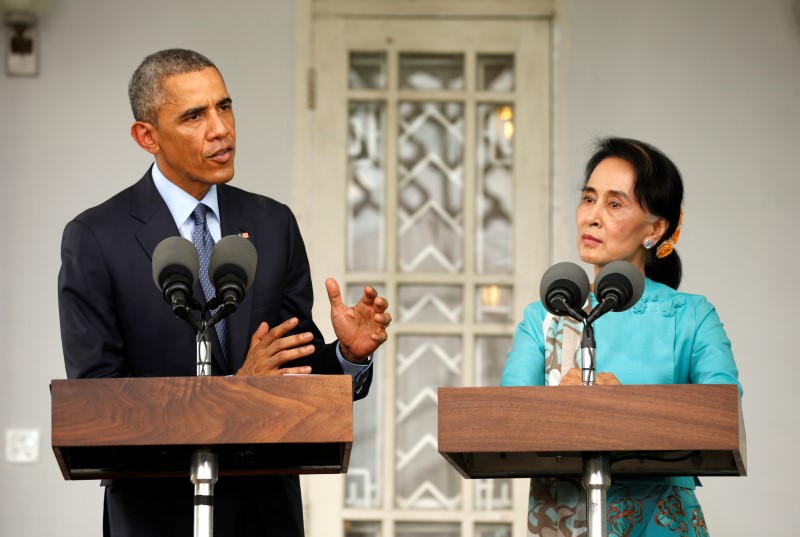By Aung Hla Tun and Antoni Slodkowski
YANGON (Reuters) - U.S. President Barack Obama called Myanmar President Thein Sein on Thursday to congratulate him on successfully staging a historic general election in which democracy champion Aung San Suu Kyi trounced the ruling camp.
Obama also called Suu Kyi and her opposition National League for Democracy (NLD), which has won about 80 percent of the seats declared so far in the lower house, to commend them for their success, which puts her on course to form the new cabinet. NLD is also well ahead in the upper house and regional assemblies.
If the full results confirm the trend, Suu Kyi's triumph will sweep out an old guard of former generals that has run Myanmar, also known as Burma, since Thein Sein ushered in sweeping democratic and economic reforms four years ago.
"The two leaders discussed the importance for all parties to respect the official results once announced and to work together with a spirit of unity to form an inclusive, representative government that reflects the will of the people," the White House said in a statement following Obama's call with Thein Sein.
Thein Sein's presidential spokesman and Information Minister Ye Htut said on his Facebook (O:FB) page: "He said America would continue cooperating with the Myanmar government."
Obama has visited Myanmar twice over the past three years, hoping to make its transition to democracy a foreign policy legacy of his presidency.
On his call with Suu Kyi, Obama "commended her for her tireless efforts and sacrifice over so many years to promote a more inclusive, peaceful, and democratic Burma."
Thein Sein and the powerful army chief Min Aung Hlaing have endorsed Suu Kyi's victory, congratulating her on winning a majority of seats in the first free election in 25 years.
The two reiterated their commitment to respect the result and agreed to Suu Kyi's request to hold reconciliation talks soon, although the parties are still to agree on the details.
Such unambiguous endorsements of Suu Kyi's victory could smooth the lengthy post-election transition, ahead of the first session of parliament, which reconvenes on Monday.
It also sets the stage for cooperation between democratic activists and the army, which had fought them during half a century of iron-fisted rule before a handover to a semi-civilian government in 2011.
PEOPLE'S CHOICE
"The government will respect and follow the people's choice and decision, and work on transferring power peacefully according to the timetable," read a statement on the Facebook page of Thein Sein's spokesman.
The armed forces also congratulated Suu Kyi. The military continues to wield considerable power in Myanmar's political institutions, under a constitution drafted before the end of nearly 50 years of junta rule.
In addition to the armed forces holding an unelected 25 percent bloc of seats in parliament, the commander-in-chief, Min Aung Hlaing, nominates the heads of three powerful ministries - interior, defence and border security.
The interior ministry gives him control of the Southeast Asian nation's pervasive bureaucracy, which could pose a significant obstacle to the NLD's ability to execute policy.
It is unclear how Suu Kyi and the generals will work together.
"Tatmadaw will do what is best in cooperation with the new government during the post-election period. Public trust can be won through correct deeds," said Min Aung Hlaing in a post on his Facebook account, referring to the military.
"Tatmadaw will continue to strengthen the multi-party democracy system," he said.
Although Min Aung Hlaing's tone matched Suu Kyi's statements seeking reconciliation, their relationship is said to be strained.
One of the biggest sources of tension between Suu Kyi and the military is a clause in the constitution that bars her from the presidency because her children are foreign nationals. Few doubt that the military inserted the clause to rule her out.
NO AUTHORITY
Suu Kyi has become increasingly defiant on that presidential clause as the scale of her victory has become apparent, making it clear she intends to run the country regardless of whom the NLD elects as president.
"I make all the decisions because I'm the leader of the winning party. The president will be one whom we will choose just to meet the requirements of the constitution," said Suu Kyi in an interview with Channel News Asia.
"He will have no authority. He will act in accordance with the decisions of the party," said Suu Kyi, adding that the president will be "told exactly what he can do."
Results so far gave Suu Kyi's party 217 out of the 330 seats not allocated to the military in the lower house.
To form Myanmar's first democratically elected government since the early 1960s, the NLD needs to win more than two-thirds of seats that were contested and, with 7 seats in the lower house not contested because of fighting in some areas, it is now only 2 seats off this target.
The NLD has said it is on course for more than 250 seats in the lower house, well above the 221 needed to control the chamber. Reuters was not able to independently verify the party's estimates of its own performance.

Final results are due no later than two weeks after Sunday's poll.